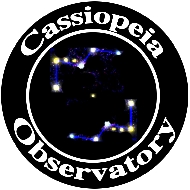D850 DSLR Moon
Posted: 5 February 2022
Friday, 4 February 2022, was clear and very windy during the daytime. The wind calmed down somewhat as sunset approached.
|
Open: Friday, 4 February 2022, 1815 MST Temperature: 53°F |
Session: 1717 Conditions: Clear, breezy |
Equipment:
12" f/8 LX600 w/StarLock
2" 24mm UWA eyepiece
Camera:
D850 DSLR
iPhone 13 Pro Max
1820 MST: LX600 ON, StarLock OFF, High Precision OFF.
Updated the International Space Station (ISS) TLE in the AutoStar for this evening's pass. Then prepared the D850 DSLR for imaging.
Viewed the Moon, 102X. Seeing was terrible.
Mounted the D850 DSLR at prime focus of the 12" telescope. Locked the 12" primary mirror. Took these photos of the Moon and Earthshine.
1/400sec, ISO 1000

1/2sec, ISO 1000

Then began preparing for the ISS pass. Took this iPhone 13 Pro Max of the observatory with the 12" telescope pointed near the location of when the ISS would become visible low in the northwestern sky. The crescent Moon with Earthshine is visible near the top of the photo. The planet Jupiter is visible near the horizon at the right.

When the ISS pass began I did a 1080p, 30fps, video recording, 1/2500sec, ISO 2000, through the telescope. I lost the ISS in the telescope when it neared the polar region in the sky. And unfortunately, the telescope focus shifted, probably due to the rapidly decreasing air temperature after I had focused on the Moon. So there was no usable image of the ISS.
Viewed M42 (Great Nebula in Orion), 102X.
1903 MST: LX600 OFF.
|
Close: Friday, 4 February 2022, 1912 MST Temperature: 43°F |
Session Length: 0h 57m Conditions: Clear, windy |
Comments are welcome using Email. Twitter users can use the button below to tweet this report to their followers. Thanks.
Cassiopeia Observatory Home Page
Copyright ©2022 Michael L. Weasner / mweasner@me.com
URL = http://www.weasner.com/co/Reports/2022/02/05/index.html
